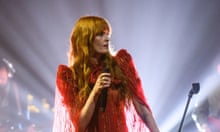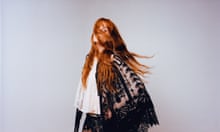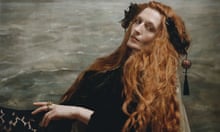There was a time when the voice of Florence Welch was as inescapable as an ambulance siren. “You’ve got the love, youuuu…” It blasted from car windows, it shot over sporting montages, it echoed through Primark. And then, just as quickly, it was gone.
Now 31, her hair less roaring fire, more gentle sunset, Florence Welch is a calmer woman than the whirling girl behind three number one albums who headlined Glastonbury in a silver suit. Today, removing her jewellery so as not to jangle over the tape recorder, she looks like the Lady of Shalott in blue jeans. It was during that everywhere period, when Welch could hear herself coming every time she stepped out of the house, that she started to crack, slightly.
“That’s when the drinking and the partying exploded, as a way to hide from it. I was drunk a lot of the time, on extra dirty Martinis – my way of drinking three shots at once. I was never interested in,” and she laughs, bitterly, “a nice glass of wine.” She says the phrase as if it were an urban myth; she had always enjoyed a party. It was in the toilets of a London nightclub that, in 2006, she auditioned in front of her now-manager, becoming Florence and the Machine and breaking America three years later. In that period she rarely slept. When she got home after a two-day party, she was always in trouble. She’d get a text, typically, “Where RU?” “And I’d be like, ‘I’m not quite sure, but I’m wearing someone else’s clothes…’ The partying was about me not wanting to deal with the fact my life had changed, not wanting to come down. It always felt like something had picked me up and thrown me around various rooms and houses, then gone ‘boom!’” She flings her arms out theatrically. “It happened every time, and every time it was shocking.”

But still, the music came, these huge bloody songs about love and loss – the director Greta Gerwig described them to Welch as “the deepest, darkest well of pain, and then you just throw a big party in there and invite everybody”. It makes Gerwig cry, she admitted, uncontrollably. The sound took some time to shape – it wasn’t until she started making music with another young woman, Isa Summers, that they emerged with the single Dog Days Are Over, a huge Kate Bush-ian snarl of a pop song that came to define her. Until then she’d been working with older male producers. “And there was an unconscious deferral, a bias against myself that felt ingrained.” Four albums in, she’s still making music the same controlled, “feminine” way, the only difference being today she knows when to take things out. “When it’s too… Florencey?” I nod then stop, for fear of seeming rude.
As she approached the 10th anniversary of this career that became very big very fast, she decided to sober up. “When I realised I could perform without the booze it was a revelation. There’s discomfort and rage, and the moment when they meet is when you break open. You’re free.”
On stage, she says, she always felt absolved – nobody was angry with her up there. It was her offstage life that she had to work on. Up there she will climb the scaffolding, holding on with one hand, leaping into the crowd and ripping her top off when she gets too sweaty. After those nights it’s quite hard for her to return to earth. Everything, she explains, starts to take on a magical significance. There will be moments – sitting in a friend’s room watching TV, for instance – when, sleep-deprived and sober, she will be suddenly awed. “Mundane moments become incredibly profound. The performing, the transcendence, then sitting watching TV – all can coexist, and the mundane makes the magical. Maybe I’m trying to hold on to normalcy. Maybe because being onstage has become normal, the pockets of peace seem really wild. But I treasure them.”
So she stopped drinking and she started staying in, and last night she watched the entire new series of Unbreakable Kimmy Schmidt. “I think I reached the bottom of Netflix.” And though her life is quieter, her work has become louder. “Before, I thought I ran on a chaos engine, but the more peaceful I am, the more I can give to the work. I can address things I wasn’t capable of doing before.”

Florence likes to trick herself. She does it with a blue pen, writing what she calls little “self dares of truth”, reassuring herself that she won’t show them to anyone. “Shh, it’s OK, it’s just us…” And it was as one of these that Hunger, the first single from her new album, High As Hope, began. The first line is: ‘At 17, I started to starve myself.’ “It’s the first time I’ve been able to put it on paper,” she whispers. ‘I thought that love was in the drugs,’ the song continues, ‘but the more I took, the more it took away. And I could never get enough. I thought that love was on the stage. You give yourself to strangers, you don’t have to be afraid.’ “But now I’ve realised that that nugget of insecurity and loneliness is a human experience. The big issues are there however you address them.” She giggles suddenly. “The weirdest thing is, that as personal as it feels, as soon as you say it, other people say: ‘I feel like that, too.’”
She was terrified, talking about her eating disorder for the first time. Not just talking – singing. Her sister was baffled. “Like, ‘You couldn’t admit this for years, and now you put it in a pop song?’” But the terror meant, Florence says, that she needed to do it.
Terror drives her, or pushes her forward, a sharp pitchfork in her back. She was an imaginative child, but imaginative in a way that sounds oppressive, confusing – she believed that ghosts and werewolves were real. Still wonders. “I learned ways to manage that terror – drink, drugs, controlling food. It was like a renaissance of childhood, a toddler’s self-destruction let loose in a person with grown-up impulses.”
Recently, she was staying at the Chateau Marmont in LA, and woke with a start to find a white dress hanging above her head. “Then suddenly I was in the bathroom, screaming. Was it sleep paralysis? I don’t know how I got to the bathroom.” It’s only recently she overcame her fear of the dark, but she says this with no embarrassment. In the lead-up to the release of Hunger, in May, she says: “I was a nightmare – I cried all the way through Avengers: Infinity War.”

Did something happen when she was 17, to trigger that descent? She pauses for a very long time. Her coffee goes cold. Outside, seasons change. Apologetically, she looks away. “I know how to deal with it in a song, but a lot of stuff I’m… still figuring out? I can say things in a song I don’t understand yet, like: ‘I thought love was a kind of emptiness’ – that feels important. You think love is unreachable, empty, hungry, then there’s a kind of sadness when something more stable comes towards you. You don’t recognise it as love because it’s not desperate enough. And I’ve never tied the two together until now.”
Is she through that now? Is she eating? She takes a deep breath. “I’m further away from it than I ever have been. It was something I experienced and I’m 31 now and at a time where I can perhaps… see what I was looking for?” Her speech is lilting, soft south London, and punctuated liberally with ellipses.
On Florence’s 30th birthday her sister had a baby, and the benefit of her new quiet life is that she’s been able to be there for her niece’s first year. “We help each other through. I’ve done career, she’s done family, and we’ve both seen behind the perfection. I’d love to be married, but I can see the good and bad in each life. I’ve wondered sometimes: ‘Did I dream too big, do I have to let it go?’” Going on tour, she’s realised, she goes into a state of stasis, popping out years later to find that not only have all her friends had kids and got married, but grown up in even grander, less definable ways, learning things like how to break up well – something she is yet to master – and how to feel “deserving of love”.
Though her father, Nick, an ex-ad executive, left London to open campsites, she lives close to both her sister and her mother, Evelyn, a professor of renaissance studies; when Florence talks about her, she nods slowly as if contemplating a difficult Sudoku.

“My mum was so worried about me doing music – she thought it was dangerous, could hurt me, could be fleeting. She’s accepted it’s not a phase now. But she’s been through a lot, so always prepares for the worst.” Her mother mourns the fact Florence didn’t go to university. Once, she told her she could remember every outfit she’d ever worn, and her mother said: “What a waste of a brain.”
But, as Florence navigates this quiet life, their similarities are becoming more clear to her. Watching Evelyn lecture about a pair of renaissance gloves she saw, suddenly, where her performance gene came from. “And people tell me I disappear – that’s like her, too, and it can be isolating in a relationship, and maybe was isolating when we were kids. Like me, I think she has big feelings, but she’s put them somewhere else, away. I’m still figuring out what that well of longing in me is, and looking at the origins.” Then there is another pause, so deep you could swim in it. “My mother’s mother committed suicide. And the way she was loved by her mother has related to the way she loves us, which then is the way we love others. My grandmother fell, so sometimes I feel like we’re all still in this loop, falling with her. The trickle-down of tragedies.”
It’s only recently that she started talking about this with her mother, and those dog days after she was 17, and the way her relationships have followed the patterns drawn in childhood when she was an “octopus of feelings”, always hungry for attention from unavailable people.
Her first book of poetry, Useless Magic, an elegant collaged scrapbook, is dedicated to her parents. The first words, written in Biro, are: “I make songs to tie people to me.” It’s in the same pen that she writes daily “sermons”, as she calls them, and she uses them to acknowledge and find the humour in the strangeness of her pop star life. For instance, she wants a record of having been drunk in a corridor with Liza Minnelli, and a record too that she knew this should never be mistaken for a normal afternoon.
These undrinking days she still enjoys parties, but uses them to dance rather than get high – if someone starts making small talk with her and there’s music playing she will literally spin away towards the speakers.
After we meet, having had a conversation that veered from recurring dreams she had as a child to a new Tinder bio (“Deeply domestic but also high stress, with no middle ground – hugely exposed but deeply hermity. Too many candles burning in my house to be safe”) she emails over a selection of these daily sermons. They’re scrappy and funny, and one ends: “I would also like a thousand texts that say ‘I love you,’ my phone buzzing endlessly, until I am exhausted, and empty. Oh shit.”
For somebody whose career balances on drama and the guttural expression of heartbreak, she seems remarkably peaceful, almost happy. But sometimes, while she is in her tour bus on the way home to London, the maggot of an idea will burrow into her mind and she will think: “Wouldn’t it be a relief to go partying now? What if… what if you just fucked it all up? What if you drove all this into the ground?” She shakes her head suddenly like there’s water in her ear. “It’s still there. This, ‘What if I could take a day off, a break from this magical energy?’ But,” she grins, “it passes.”
High As Hope is out now. Useless Magic is out on 5 July, £20, Penguin Books. Buy it for £17 at guardianbookshop.com
Styling by Aldene Johnson; hair by Anna Cofone; make-up by Sarah Reygate; stylist’s assistants Lauren Anne Groves and Elle Fells; shot at William Morris’s Red House, Bexleyheath (National Trust)











Comments (…)
Sign in or create your Guardian account to join the discussion